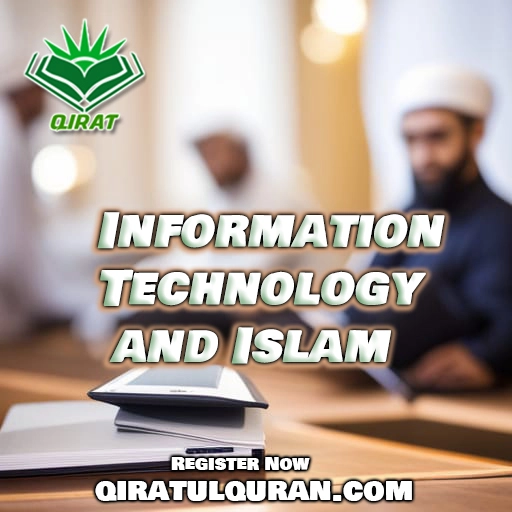Information Technology and Islam: Information technology (IT) has become an integral part of modern life and society. From smartphones to social media, IT permeates many aspects of daily living. The rapid advancement and proliferation of IT have prompted discussions among Muslims about its relationship with Islam and whether the use of modern technology aligns with Islamic values and teachings. In this article Qiratul Quran will provide an overview of IT from an Islamic perspective, examining key considerations around ethics, privacy, connectivity, and progress.

IT and Islamic Ethics
A core tenet of Islam is Akhlaq – ethics and moral character. Muslims believe technology should be employed ethically and for the benefit of society. While IT itself is viewed as morally neutral, its use may be deemed moral or immoral depending on the intentions and outcomes.
Privacy and Modesty
Many Muslims emphasize information privacy rights. The Quran prohibits spying or backbiting. Accordingly, technologies that infringe on privacy without consent are often criticized. Muslims are also expected to dress and behave modestly offline and online. Revealing photos or content on social media may be considered immodest.
Truth and Deception
Truthfulness and honesty are paramount in Islam. Muslims are advised against deception, slander, and the spread of misinformation – regardless of the medium. Therefore, circulating fake news or propaganda conflicts with Islamic values. Content shared online is expected to be truthful and transparent.
Digital Connections
The internet enables new methods of communication. However, some technologies are seen to distance people or replace in-person interactions. Excessive social media use, online dating, and inappropriate digital relationships may be cautioned against. Building real bonds and community is prioritized over superficial connections.
IT and Islamic Progress
Information Technology and Islam encourages the pursuit of knowledge and education. Muslims believe gaining proficiency in IT can enable progress, on individual and societal levels. IT is considered integral to modern life, and Muslims aim to use it in constructive ways.
Access to Knowledge
The internet has democratized access to education – aligning with Islamic principles on seeking knowledge. Online learning expands opportunities. Digital libraries, databases, and educational tools allow convenient access to information.
Career Development
IT skills are crucial for many professions. Early adoption of emerging technologies may give Muslim communities an edge. Initiatives exist to increase IT literacy and teach young Muslims digital skills to empower them. having tech expertise is seen as key to unlocking jobs and economic mobility.
Da’wah Through New Media
Da’wah refers to propagating the Islamic faith. The internet presents new da’wah possibilities by reaching people globally. Digital da’wah initiatives include Q&A sites, video lectures, and online forums to discuss Islam. Social media allows for building connections and sharing of Islamic lifestyle and values.
Guidance on IT Usage
To address IT’s implications, Muslim scholars provide guidance rooted in Islamic law and principles:
Righteous Intentions
Users should reflect on their motivations and intentions before posting or clicking. Technology should be utilized for good, not vanity, deceit, or malice. Moderation and mindfulness are key.
Verifying Sources
Misinformation is pervasive online. Users are advised to verify content before believing or sharing and avoid spreading rumors. Authentic, credible sources should be confirmed.
Rule of Law
Muslims must abide by the laws and terms of service of the online platforms they use. Hacking, spamming, and piracy are prohibited unethical behaviors. Respecting cyber laws aligns with following just rules.
Parental Discretion
Parents are responsible for protecting children from inappropriate content and setting wise restrictions on tech usage. Monitoring and active parenting can prevent problems stemming from unguided internet use.
Conclusion
IT holds tremendous potential to improve Muslim lives and communities if harnessed constructively. The Islamic moral framework aims to guide technological advancement in ethical directions that fulfill meaningful purposes. With mindful and moderate usage, Muslims can benefit immensely from IT tools and innovations in the modern digital landscape.





